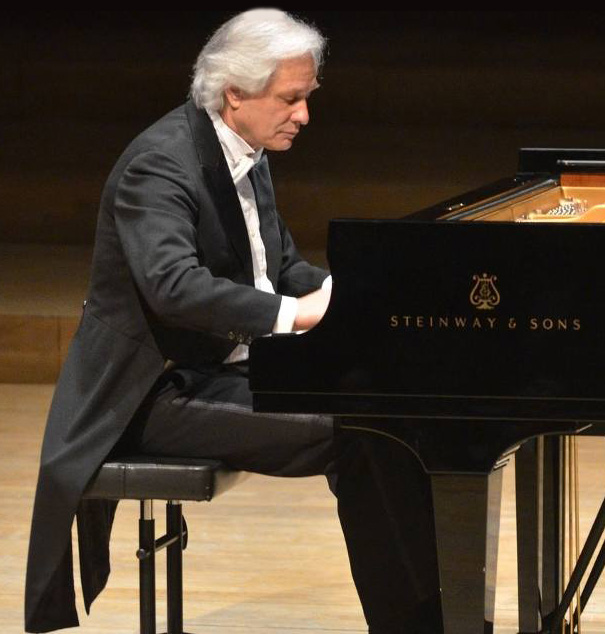Rhythm of the Heart and Clarity of the Mind
Chopin Society of Atlanta’s exclusive interview with pianist and conductor, Marek Drewnowski
By Bożena U. Zaremba
It has been ten years since you granted me the previous interview.* What has happened in your life since then?
Ten years have passed! Time surely flies fast. This question makes me feel uneasy, because it reminds me of the passing of time. Ten years is a lot. I need to do an act of contrition [laughs]. I cannot say that during those ten years everything went according to my wishes, but I worked a lot, went on concert tours, made recordings, worked on a screenplay about Paderewski; I taught; I served as an academic adviser to Ph.D. students; I was promoted to the rank of Professor**, I taught at Scuola Cantorum in Paris; I gave master classes all over the world, even in Africa and Korea; and now I am at the Hacettepe University in Ankara, at the department of composition and conducting.
Also during this time, Harmusica in Geneva offered to have me record all of Chopin’s works, which was most interesting. I am halfway through. So far, I have recorded concertos, sonatas, variations, etudes, preludes, ballads, and waltzes. Unfortunately, in 2015, the driving force behind this project, Ms. Gabrielle Dufour, died and the project had to be put on hold. I am currently in negotiations with the Hacettepe University to continue the recordings. I will be in Ankara till December, and I hope to be able to finish the project. We shall see. This is a costly undertaking. There are also other challenges. I am currently in search of a singer for Chopin’s songs. It is not an easy task, because the majority of classically trained singers exhibit operatic mannerisms; they usually have huge voices with a distinctive vibrato and Chopin’s songs do not tolerate that. They are simple, and simplicity is most beautiful but, at the same time, most difficult to sing. These songs call for someone with strong musicality but with a pure, unpretentious voice, even with a folk undertone.
Ten years ago we talked a lot about emotions. Has anything changed in your approach toward music?
For me, music without emotions is not music at all. Music can better convey moods, thoughts or feelings than pure poetry—providing the musician is perceptive and has strong personality, of course. I love poetry, but words represent something tangible. Music does not; it is surrounded by soul.
What was Chopin’s personality like?
Complicated. On the one hand, he was masculine; on the other hand, childish, feminine, moody, emotional, witty, melancholic, heroic, miserable, depressed, clownish, happy, mean, kind, flirtatious, offended, hurt, magnanimous, and stubborn.
Does the pianist need to understand the composer’s personality to play his compositions convincingly?
Definitely. This is the key. It is like in a marriage: If you don’t understand your spouse, you cannot coexist. Like a medium, a good musician needs to succumb to the music, to adjust, and even identify with it. But there are fewer and fewer musicians like this. We have different times now, and only chosen elites are interested in [classical] music. Audience sensitivities have changed, too; they have become more “progressive,” and I mean it in a negative sense.
However, Chopin is still very popular, especially in Poland. His music has a special place in Polish history and culture.
Absolutely. His music conveys our patriotic sentiments and national bonds in an exceptional way. It also expresses our temperament and the richness of emotions that are deeply imbedded in our national character. It spans from anger to affection, from sadness to delight, from the fervor of love to the flames of hatred, from courage to recklessness, from moments of happiness to broken souls. We know chivalry and valor just as well as painful falls. Chopin perfectly grasped this character with his music, which uniquely shows the palette of our national passions. During many difficult moments in our history, it bonded us and gave us consolation. At the same time, his music is universal; it is cosmic. Almost all nations can see their reflection in our mirror and find similar traits.
Still, pianists who give us thrills while playing Chopin are scarce.
Because nowadays the common demand is for people who play without making mistakes, who never play a foreign sound and are absolutely perfect. Although Chopin’s music is played all over the world, I feel that few musicians are privileged to understand it. I think it was different in the past. Take Hoffman, Paderewski, and later Rubinstein. There was a certain simplicity in their performances. Another issue is that in order to play Chopin’s music well, one has to pay attention to his notation. Chopin was very meticulous in this respect. Every dot, every rest, and every slur were precisely noted. His form was always well-defined and clear.
Chopin is considered to be a great innovator. What are his most important contributions to music?
One is his attempt to break the classical tradition of the bar line, which he tried to conquer. In other words, Chopin starts to build a musical thought—a phrase—most often in the second quarter of the bar, in order to evade the bar line. This was pioneering. It can be clearly seen in his mazurkas, or in the finale of his Sonata No. 2. In addition, his compositions are very technical; their complexity can compete with that of Liszt’s. His form is different. His harmony is different. Let’s take his Piano Concerto No. 1 [in E minor], for example: The first movement ends with the dominant. Who had done it before him? He created etudes, mazurkas, and nocturnes. His compositions surpass the common comprehension of his epoch. But in my view, the most crucial characteristic of Chopin’s music is its emotional complexity, which is not so prevalent in other composers. Each of his major compositions has two parallel layers: one intellectual and one emotional. You cannot play any of his nocturnes without emotions. You can play the notes, but it will not be true to Chopin. Emotions are indispensable. In addition, you need to improvise and play in a different way each time you play. You also need a concept, a vision. For example, the second movement of the Piano Concerto No. 1 is to me a clear embodiment of a duet between a man and a woman. The man is asking for something; the woman is answering. These are very delicate matters. I could talk about Chopin’s innovativeness for a long time, about his original ideas and influence on his contemporary musicians as well as later generations, but this would take a lengthy theoretical discussion.
Rarely do we see such deep and profound examination of music by today’s pianists.
Because everyone is pursuing pleasures and money. Nobody is interested in detailed analysis of a composition. Everyone is looking for ready solutions, not for a truth. It is because, unfortunately, music education is collapsing. Musical families can raise musicians, but there is no music education at schools. No one is educating the audience, either. We are on the verge of a new epoch, where culture is turned upside down. We need to work on the fundamentals. Music critics are disappearing, and good musical studies are on the decline. I will give you an example from my own vicinity. My son, Michał, who is a teacher at the Academy of Music in Łódź and who is a wonderful pianist (I will not be modest here, and I will say he was my student), discovered a fantastic and completely forgotten composer, Tadeusz Majerski. After the war, Majerski refused to leave Lviv. He stayed there for the rest of his life and sank into oblivion. Michał has recorded Majerski’s piano concerto with the Royal Scottish National Orchestra under Emil Tabakov and the New Art Chamber Soloists quintet.*** This is a great CD and I am very proud of my son, but not a single review has been published in Poland since its release. Can you imagine that? One review was published in England, but it had errors: They named me as the pianist and included ads for my CDs. Nowadays it is really hard for a young artist to break into the music scene.
That is why competitions are important as they help them start their career. You are not in favor of competitions, are you?
But I do not question their purpose. Competitions are often the only way for young people to become professional musicians. However, I always stress their limitations. How can you find the right ambiance in the competitive environment and with the extra stress? Then you have the “omnipotent” jurors, whose presence adds to the anxiety. In order to win competitions, one needs physical and mental stamina, not only flawless preparation. Sensibility and the understanding of Chopin’s intricacies of emotions may not necessarily be helpful then.
Why is music so important in our lives?
We all have a need for beauty in its purest form, and through music, we can express things that we cannot express with gestures, facial expressions, and words. Music is a language, a language of thoughts and feelings. It is a vehicle, both intellectual and emotional, which helps us communicate our ideas, sensitivities, longings, joys, sorrows, wonders, anger, bewilderment, and grief. Music does this directly and immediately. It is immaterial, unlike words.
What is so unique about Chopin’s music?
There are many composers, who impress us with harmony, beautiful narrative and melodies, and thrill us with elaborate phrasing or mathematical fugues. They do appeal to our sense of harmony and esthetics, but no composer appeals to the listener like our Fryderyk Chopin. The emotions in his music are close to each and every listener. They evoke all our thoughts and feelings, even those normally hidden deeply in our hearts. They provoke reflection. What is most beautiful about Chopin’s music is its genuineness and honesty, as well as his vocal treatment of melody and phrase. His music is charismatic. It makes us laugh, cry, be moved, be courageous, feel goodness and longing, and see beauty. It makes us want to sing and dance. Chopin’s music has the rhythm of the heart and clarity of the mind.
February 21, 2017
*This interview can be read at http://chopinatlanta.org/interviews/MarekDrewnowski2006.html
**In Poland, the highest rank of Professor is an academic degree bestowed by the country’s President upon the recommendations of the university and its academic community.
***Toccata Classics, January 2017







